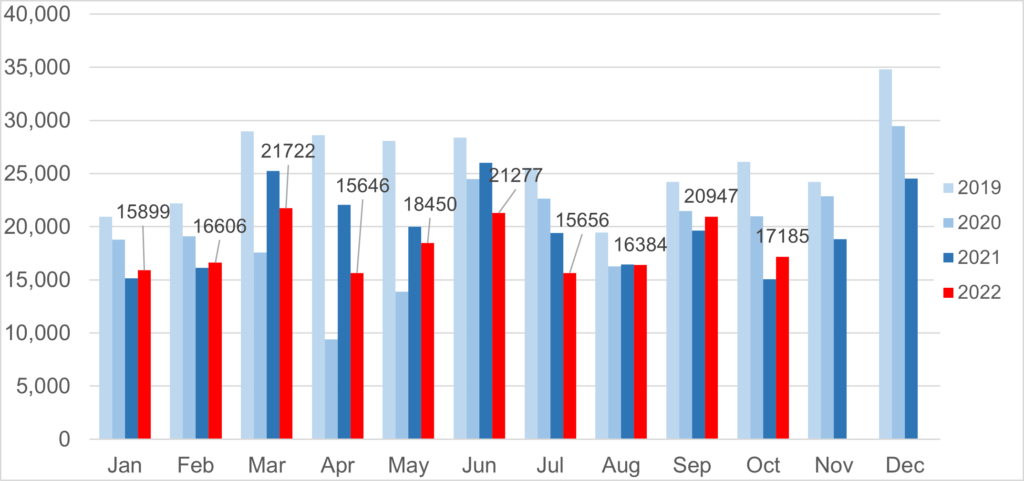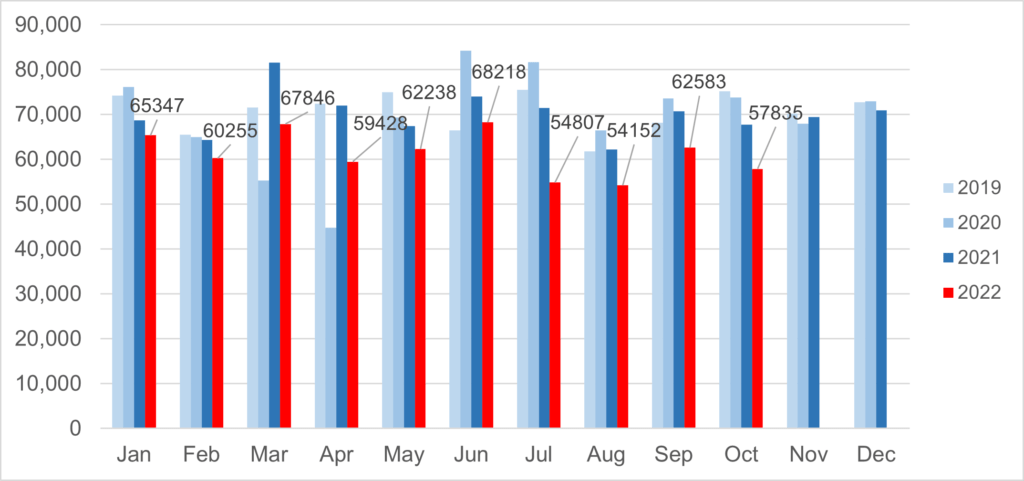Swiss new-car registrations recover in October but used-car market comes under pressure
21 November 2022

Hans-Peter Annen, head of valuations and insights at Eurotax Switzerland (part of Autovista Group), analyses how the country’s new and used-car markets performed in October.
The weak spring and summer figures for new-car registrations did not continue into October, which like September, performed better than the previous year. This has helped reduce the overall year-on-year decline. Despite the war in Ukraine, supply-chain uncertainties, inflation, and rising energy costs, the outlook for the last two months of the year is somewhat optimistic.
Slight recovery expected
In October, 17,185 new passenger cars were registered, up 14.1% year on year. But compared to 2019, new-car registrations were still down 34.2%. The first 10 months of 2022 saw a significant year-on-year fall of 7.9% (-28.8% versus 2019).
The share of so-called alternative drive systems, including electric vehicles and mild hybrids, made up almost half of the market. A further, albeit slight, recovery in new-car registrations can be expected for the remainder of 2022, despite ongoing uncertainty.
New-car registrations by month: 2019-2022

Source: Eurotax/ASTRA-IVZ
Buoyant used cars
The used-car market, on the other hand, has been buoyant for more than two years, underpinned by stable demand and low supply. However, supply is now increasing again. In 2021, used-car transactions inched up 1.1% to 840,044 units, almost reaching the same pre-pandemic level seen in 2019.
But in the first half of 2022, the volume of ownership changes took a strong hit and was 8.5% below the previous year (according to the previous counting method, see the note below).
The data for the first 10 months of 2022, according to the new counting method, sit below the previous year’s volumes but are no longer directly comparable. This means the upward trend was broken in 2022. The development towards declining changes of ownership is likely to continue as long as new-car registrations remain low.
Used-car transactions by month: 2019-2022

*Note on the figures for 2022
Since the beginning of 2022, the Federal Roads Office ASTRA provides figures for changes of ownership. Before that, up to and including June 2022, ASTRA supplied raw data with all changes in Switzerland’s vehicle stock. The analysis of changes of ownership was carried out by Eurotax, partly with assumptions. The figures calculated in this way were approximately 3% higher than the volumes according to ASTRA’s own new evaluation from 2022 onwards. For this reason, we have shown figures for 2022 based on this ASTRA data. The volumes up to and including 2021 are shown according to the previous method. When comparing the figures for 2022 with previous years, this must be taken into account. Comparisons are therefore only possible to a very limited extent, if at all.
Although the number of used cars on offer has recovered steadily in recent months, the volume is still around 11% lower than in February 2020. Offer prices for diesel and petrol models have benefited particularly from this shortage.
Plug-in gains
Plug-in and, above all, full hybrids were also able to make gains, albeit to a lesser extent. In the meantime, the price trend is slightly down or constant. Battery-electric vehicles (BEVs) are struggling to return to 2020 levels across all age groups. However, younger models are an exception. Among 12-month-old cars, BEVs take the top spot in residual value (RV) retention terms, with an average trade value of 83.5% of their original list prices.
New-car sales are also unable to recover significantly, given recurrent lockdowns and factory closures, at least in China. The prices for used cars are flattening out or declining slightly, but at a high level.
The supply situation, also in relation to consumer sentiment and demand, is crucial for the future development of the used-car market. Residual values are only going to come under pressure if demand for used cars drops significantly due to the gloomy economic outlook and supply fears. In the meantime, they will remain at a high level.